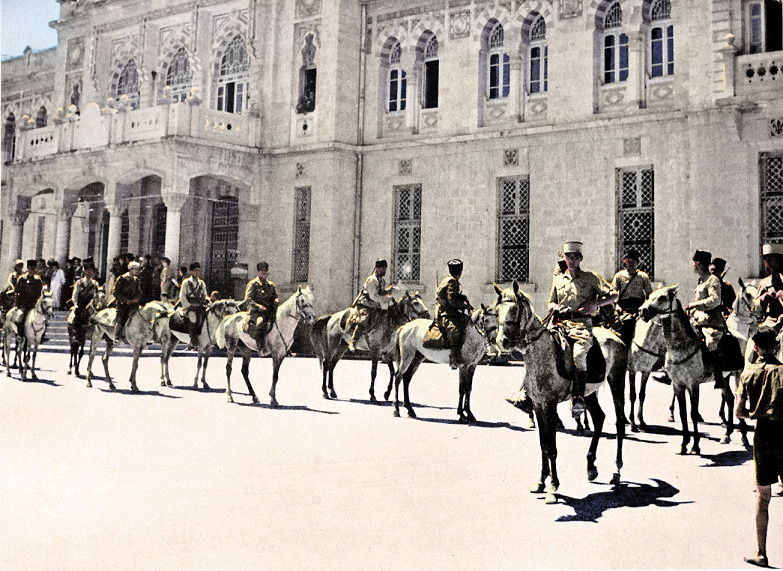ALLIED TROOPS BELIEVED STORMING DAMASCUS
By Sidney J. Williams, United Press staff writer
London, June 19 –
Allied forces are believed to be storming the ancient city of Damascus after a Vichy troop refusal to surrender, it was said authoritatively.
A British ultimatum to surrender the city, in order that it might be spared the ordeal of battle, had expired at 5:30 a.m. (11:30 p.m. Wednesday ET).
It was “very probably” that operations against the city, believed to be the oldest inhabited city in the world, started immediately after the expiration of the ultimatum, authoritative informants said.
British Empire and Free French troops had been massed east, west and south of Damascus awaiting the order to attack.
General Sir Henry Maitland Wilson, the Allied commander-in-chief, had broadcast from Jerusalem last night the ultimatum to General Henri Dentz, the Vichy commander:
My troops are on the outskirts of Damascus. I do not wish to endanger the inhabitants of the city and I appeal to you to withdraw from the city. Otherwise, military action will be taken.
Should you refuse the responsibility for the city is yours. I expect an answer by tomorrow at 5:30 in the morning.
I send this message over the radio as the only means of reaching you. Send your answer by airplane with a white ensign, which will be respected.
It was reported from Ankara that General Sir Archibald Wavell, British commander-in-chief on the Middle East, had arrived at Baghdad to direct a big Allied attack in Syria from the Iraqi frontier.
U.S. Department of State (June 19, 1941)
740.00119 European War 1939/732: Telegram
The Secretary of State to the Comal General at Beirut
Washington, June 19, 1941 — 7 p.m.
104.
The following message has just been received from the British Embassy in Washington:
-
You may assure the State Department that His Majesty’s Government would be very ready to consider satisfactory arrangements whereby our strategic requirements in Syria are fully safeguarded. Far from desiring to impose any dishonourable terms on General Dentz His Majesty’s Government are fully prepared to accord full honours of war to him and other civilian and military officers who have only done what they conceived to be their duty by their Government.
-
There is therefore no question of General Dentz or any other civilian or military official being condemned to death or to any other penalty.
-
The following is outline of terms which we would be prepared to accept:
i) Negotiations for cessation of hostilities, to be carried on between General Wilson9a representing Commander-in-Chief and Vichy authorities in Syria.
ii) Hostilities to cease at once and Vichy forces to concentrate in selected areas. All the compliments of war will be accorded.
iii)
(a) Surrender of all war ships and of all naval establishment intact. Note: Should this be unacceptable, alternative has been authorized.
War ships to be handed over intact for internment and subsequently to be reduced to care and maintenance basis at Beirut. With power to move as ordered by Commander-in-Chief, Mediterranean if safety considerations demand it.
In either alternative return of the ships after the war to a friendly France or compensation is guaranteed.
(b) Other ships including British and harbour services to be handed over intact.
iv) All aircraft whether Vichy or Axis and war material to be handed over undamaged.
v) All service personnel to be given the opportunity to join the Free French. Those who do not wish to do so will be repatriated as and when possible.
vi) The High Commissioner, his Staff and all French officers and nationals other than those who are prepared to remain will be repatriated as and when possible.
vii) All ports, all communications, fuel, stocks and guns to be handed over intact for our use.
viii) The exact position of mine fields will be disclosed.
ix) The Administration and public utility services to be maintained and operated for the time being under Allied Military direction.
x) Cable and wireless services to cease operations and to be handed over intact.
- His Majesty’s Government suggest that the United States Consul General should be instructed to get into touch with General Wilson who is being authorised to give him full information. We shall be grateful for Consul General’s personal services as an intermediary.
You are authorized to act as an intermediary in the event the French authorities desire you to do so. If you receive a request to assist in an arrangement for the cessation of hostilities, you are authorized to communicate with General Wilson. Please keep the Department fully and promptly informed by telegram of all developments.
HULL
